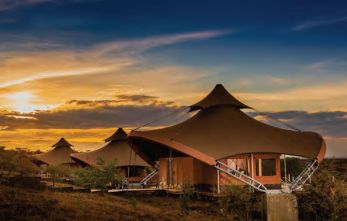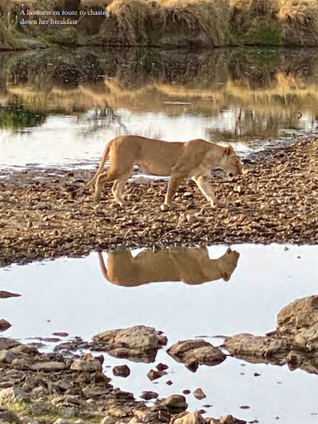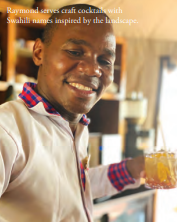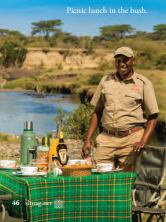WILD AND WONDERFUL
- May 1, 2023
- 6 min read
Culture, philanthropy, and camaraderie enhance the safari experience at Mahali Mzuri.
Written by Bridget Williams

Under any other circumstances, hearing an unfamiliar man's voice call out in the pre-dawn darkness to rouse me from sleep would have sounded an immediate alarm. But here, following my first night at Mahali Mzuri, during which I listened intently to an intermittent cacophony of animal noises so close I was certain that the Great Migration was taking place outside my tent, the endearingly low-tech wake-up call put a smile on my face as my brain navigated the fuzzy boundary delineating dreamland and reality
Opened in 2013 and part of Sir Richard Branson's portfolio of luxury properties operating under the Virgin Limited Edition umbrella, Mahali Mzuri is one of just five safari camps in Kenya's Olare Motorogi Conservancy, part of the larger Maasai Mara ecosystem. The result of a comprehensive and collaborative effort to provide a mutually beneficial arrangement for wildlife and the Maasai pastoralist community, there are only 94 beds allowed within its 33,000 protected acres, meaning that visitors get incomparable and uncrowded wildlife viewing experiences.
The five camps located in the conservancy make monthly rental payments to local tribes and donate $5 per night per guest to The Maa Trust (themaatrust.org), a research-based nonprofit organization dedicated to the empowerment of Maasai women, youth, and children for the long-term sustainable conservation of the Maasai Mara ecosystem. Mahali Mzuri takes its philanthropy a step further by supporting a local primary school. A visit here is a humbling experience, particularly when considering what conditions were like before the recent renovations. Resort guests can have a donation to the school added to their folio at checkout or request the school's wish list before their stay as part of their "Pack for a Purpose" program. Visits can also be arranged to the Maa Trust's beading shop and a local village, where 100% of the tour costs are donated back to the community.
At Mahali Mzuri, which means 'beautiful place' in Swahili, accommodations encompass 12 tented suites that cantilever over a valley bisected by something more precious than gold in this parched region: the Olkuroto River. Technically glamping, the spacious tented suites are far from roughing it. Outside, the colors of the canvas blend with the local stone and indigenous red oat grass. Inside, interior designer Yvonne Golds of Real Studio worked closely with Kenyan designers and artisans to source local fabrics, furniture, and artwork. A generous overhanging roof creates an oasis of shade on the tent's large terrace and makes an ideal spot for afternoon yoga during the time in-between game drives. It was surreal to come up from a downward dog to see a giraffe nibbling the treetops below my tent.

When it's dark, guests must have a Maasai tribe member escort them from their tent to and from the common areas. One evening I asked my guide if he ever spots animals close to the walkway; a quick flick of his flashlight to the right illuminated a massive water buffalo chomping on grass. Smiling from ear to ear after seeing my surprise, he said, "No fences here."

Splitting the camp in two is a common area comprised of tents for dining and lounging and a large deck with ample seating for savoring the view. This centralized setup brings guests together at various points throughout the day to swap stories of what they'd seen and experienced, creating charming camp camaraderie. Of course, it also doesn't hurt that the food is outstanding. I particularly enjoyed the soup of the day – cold at lunch and hot at dinner. In-camp meals are complemented by experiences like campfire cocktails and a lavish buffet BBQ dinner in the bush. At the lounge tent, bartender Raymond serves up craft cocktails with Swahili names inspired by the animals and the landscape. My favorite was the "Dawa," an easily replicable chilled version of the hot toddy made with vodka, lime, and honey.

There are two game drives each day. The first departs just as the colors of the sky turn from bruised to blush. When asked what was on the itinerary, Jackson, our guide, responded, "a game driveis like fishing…let us see what nature will provide us." Nature felt particularly peacocky on our inaugural morning drive, with the opening hours unfolding like the acts of a dramatic stage play. Fifteen minutes after leaving camp, we spotted a trio of impossibly cute lion cubs from the Iseketa pride languidly sunbathing atop a rock when the lionesses suddenly sprang into action. Jackson told us to hold on and gave chase in our 4x4 vehicle. Soon we were witnessing the lionesses taking down a trio of wildebeests a few hundred feet from our vehicle—close enough to hear flesh tearing and the lionesses' guttural grumbles of satisfaction.
Initially unsure of how we'd feel about a front-row seat to such a "circle of life" moment, in short order, our group acted like Romans watching a battle in the Coliseum and calling for more. Jackson soothed our sad feelings for the doomed quadrupeds after telling us that the Swahili term for the wildebeest is sifuri ubongo, translated as "zero brains." However, our bloodthirst was tested on a subsequent outing when a tiny leopard cub came dangerously close to being a hyena's lunch. Moments like this, and seeing a doe-eyed Jackal, who could have been ripped from the pages of a Disney storybook, carrying the head of a baby gazelle in its mouth, gave me a whole new perspective on life and the fact that my worries seem trivial when compared with constantly worrying about being eaten!
It was candy that drew Jackson, who grew up on the main road leading into the conservancy, to become a guide. Noticing that "little white jeeps" always had an ample supply of candy, he and his friends would run alongside, yelling, "give me sweets" (something we also heard at the primary school). "I told my friends I wanted to be a driver because I was sure I'd get lots of candy," he laughed. With fifteen years of experience, Jackson explained that becoming a guide is more than just learning to drive; he holds a specialty certification from the Koiyaki Guiding School. Book smarts and natural curiosity combine to make Jackson a wealth of knowledge about wildlife and the region's 43 distinct tribes. I quickly filled a notebook with his anecdotes, from Maasai burial practices to how fences and elephants have accelerated deforestation.

During our conversations with Jackson, it was interesting to learn how the culture of the Maasai continues to evolve as tourism improves their quality of life. Programs like Lighting Up Africa, which brings renewable, off-grid energy to remote communities, allow for access to the internet and the outside world, but traditions persist. For example, while the iPhone in his pocket signals success, Jackson said the measure of his personal wealth remains based on the number of cows in his herd.

Constantly scanning the horizon, eagle-eyed Jackson always spotted the next frame of our highlight reel from far away and jokingly referred to our many erroneous sightings as "ATLs," or "animal-looking things." Unlike the Maasai Mara, where vehicles are limited to designated roadways, guides in the Olare Motorogi Conservancy are free to go off-road in a respectful pursuit of wildlife, who generally seemed unbothered by our presence, as long as we kept all of our extremities in the vehicle. Jackson said that while it would be common to have 20 vehicles crowded around a sighting in the Maasai Mara, in Olare, only five can congregate.
Like the wildlife who seek shade to sleep away the heat of the day, the afternoons at Mahali Mzuri are all about relaxation. Some guests retreat to the infinity pool, nestled into a natural alcove of grey boulders, or to the spa, located in a secluded spot close to the valley floor.
Making an appointment at the latter was a no-brainer following a blissful neck and shoulder massage offered during check-in, an amenity I'd choose over a welcome cocktail any day.

After dinner each evening, I'd settle into bed, grateful for the thoughtful addition of a hot water bottle under the sheets to avert the evening chill (along with one waiting in my seat in the 4x4 each morning). I was excited to drift off to sleep, not only because I was physically spent following the fullness of the day's itinerary but also because I knew my dreams would be splendidly saturated with the colors and culture of Kenya. sl
Rates at Mahali Mzuri start from $1,700 per person/night. For more information and reservations, visit virginlimitededition.com/en/mahali-mzuri.




























Comments